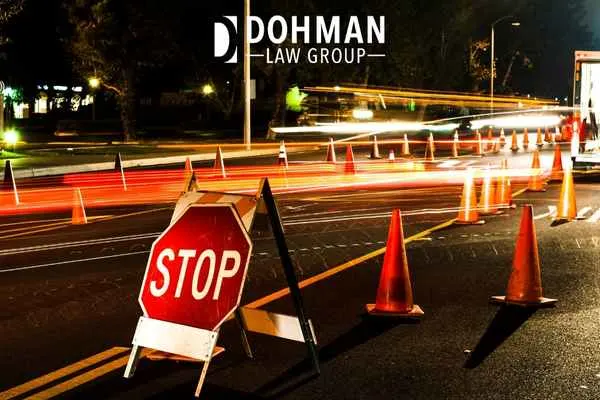Are you familiar with the concept where cops set up checkpoints where they go through every car and check if they have been drinking and driving? These DUI checkpoints are also called sobriety checkpoints and they are used to catch people who are drunk driving with the help of field sobriety tests.
It can be a difficult experience for many drivers who have not yet experienced field sobriety testing. Many people also question the legality of sobriety checkpoints and their impact on drivers. As a resident of Illinois, it is very important for you to have all the information you need regarding the sobriety checkpoint program and what your rights are if you are stopped at one. Let’s start with the history of police sobriety checkpoints.
History & Legality of DUI Checkpoints
There has been a question on the constitutionality of sobriety checkpoints for a long time and it was argued that random sobriety checkpoints serve to minimize drunken driving.
The counterargument by the masses suggested that the checkpoints on drivers were violating the Fourth Amendment and this amounted to unlawful stopping by police officers. However, the Michigan Dept. of State Police v. Sitz, 496 U.S 444 (1990) with the Supreme Court ruled that these sobriety checkpoints were in accordance with the Fourth Amendment in terms of reasonable search and seizure.
The court went on to state that the Supreme Court that it was important to stop drunk drivers and that these checkpoints did not have a severe impact on the Fourth Amendment constitutional rights of drivers.
With that, the Court also left the decision of legality to every individual state’s discretion. With that ruling, many states such as Rhode Island determined that these checkpoints were a violation of their constitution and that unreasonable searches were a civil rights violation.
The rest of the states have sided with the Supreme Court’s 6-3 decision and believe for the sobriety checkpoints to be legal. Therefore, these checkpoints are legal in Illinois.
Conducting DUI Checkpoints
According to the Illinois Department of Transportation, you need to follow the following DUI checkpoint guidelines:
- It is required by the state for the authorities to announce these checkpoints and the checkpoints – law enforcement should inform the public that they intend to conduct a DUI traffic safety checkpoint. They can either announce it using a press release or an advertisement in the newspaper.
- The police do not have the jurisdiction to stop any car they want, they must have comprehensive operational plans that explain that only random drivers at sobriety checkpoints will be stopped. For instance, they can determine for every third driver to stop so the checking is at random.
- These checkpoints must be constrained to time and they shouldn’t continue without any predetermined end. There needs to be an active timeframe determined by the authorities.

Is Every Car Subject to a Stop?
There is no specific ruling that requires every car to stop and the law has changed over the years as many people have reservations about who was stopped. This is why courts have determined that there should be a formula that determines seizures by law enforcement. For instance, law enforcement personnel can stop every fourth car at random and examine or question them.
What You Should Do At DUI Checkpoints
There is a great possibility that law enforcement personnel may stop you at a DUI checkpoint. In order to avoid any problems you must understand what you should do in such situations.
You Must Stop Always
If you have been asked by the police to stop do not resist it is best to comply whether or not you think that they have reasonable suspicion. To avoid any issues, stopping is the best choice.
Keep The Fifth Amendment In Mind
You may think that is it crucial to answer any questions that the police officer may ask you, but according to the Fifth Amendment you do not have to answer any questions that you may think will lead to your incrimination.
Refuse any questions that you are not comfortable answering. They are responsible to gather evidence against you by asking the driver questions, you shouldn’t willingly give them the information.
Avoid Traffic Violations
Do not break traffic laws even if you have been asked to stop at a sobriety checkpoint. Adhering to traffic rules is still a requirement, if you fail to adhere, you may still be pulled over for reckless driving.
Politeness Will Go A Long Way
Do not pick a fight with the police officers and avoid complaining. Be very polite and try your best to stay neutral.
Do I Have to Submit to Testing?
Field sobriety tests are not mandated by the law. It is with your sobriety checkpoint rights to refuse any standardized field sobriety tests. The police may use the FSTs to give a cause of arrest but you can refuse other tests and provide the officer with your driver’s license and automobile insurance. It is a wise idea to carry proof of insurance so you do not have to answer further questions.
Get Legal Representation
If you are arrested on a DUI charge, it is very important for you to get a legal defense team on your side. The first thing you must do is to take help from a criminal defense attorney. Make sure you contact an experienced attorney so they can take over your case and help you get the best possible outcomes.
It is a timely matter so the sooner you contact a DUI defense lawyer, the better it will be. The Dohman Law Group is one of the most experienced law firms and can help you work in the right direction.


